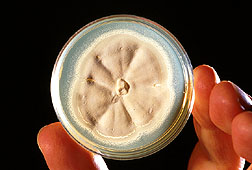This page has been archived and is being provided for reference purposes only. The page is no longer being updated, and therefore, links on the page may be invalid.
|
|
Canola Oil and Fungal Mixture May Help Stop a Hopper ScourgeBy Amy SpillmanNovember 13, 2002 During the summer of 2002, grasshopper infestations in the western United States were some of the worst reported in more than 60 years. The insects' numbers swelled so high that the governor of Utah declared a state of agricultural emergency. Currently, chemicals such as carbaryl, diflubenzuron and malathion are the only effective and economical insecticides on the market that land managers can use to battle grasshopper infestations. Now, however, scientists with the Agricultural Research Service and University of Wyoming-Laramie are studying what could become a less costly and more environmentally friendly alternative--a mixture of a naturally occurring fungus and canola oil. Stefan Jaronski, a research entomologist at ARS' Northern Plains Agricultural Research Laboratory in Sidney, Mont., is collaborating with insect ecologist Jeff Lockwood and others at the university in a large-scale evaluation of Beauveria bassiana. The all-natural fungus is effective against grasshoppers and is commercially produced, but it's also expensive, costing between $16 and $32 per acre of treatment. In earlier research, Lockwood discovered that grasshoppers are attracted to canola oil, and Jaronski verified its potential to increase the effectiveness of the Beauveria fungus in greenhouse tests. Now, the scientists are coupling the fungus with a canola oil carrier and applying it to alternate strips of land to determine whether the mixture can be effective under field conditions. If it is, they will also determine how little of the mixture is needed per acre for it to remain effective. Both aerial and ground applications are being used in the 560-acre test, which began in the summer of 2002 and will end in 2004. According to Jaronski, the first field trial has been very encouraging. If their final results are also positive, an affordable biological treatment to stop grasshopper infestations may be on the market in the not-too-distant future. The researchers will be presenting the data they've collected so far at the Entomological Society of America annual meeting to be held November 17-20 in Fort Lauderdale, Fla. ARS is the U.S. Department of Agriculture's chief scientific research agency. |

